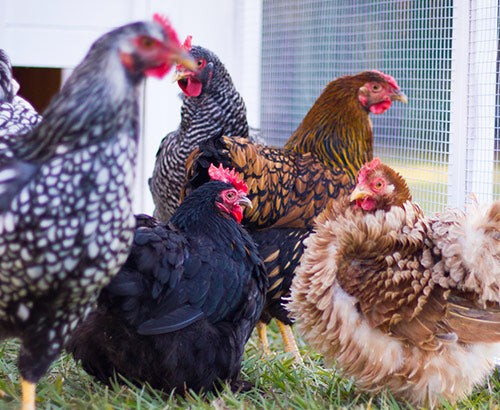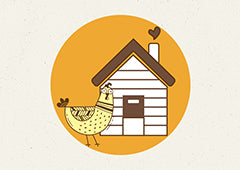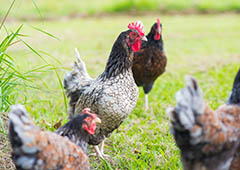The Plymouth Rock is one of the best all-rounder chickens you're likely to find. Its a prolific egg-layer, it’s great as a table bird, and it’s a fantastic backyard chicken for families. Find out all you could ever want to know about the Plymouth Rock chicken with our comprehensive guide!
Lifespan
The lifespan of the Plymouth Rock depends on how well they are cared for, and the quality of life that they enjoy. A standard Barred Plymouth Rock will generally live for approximately 6-8 years, but have been known to reach 10-12 years.

Class
Plymouth Rock’s are classed as a ‘dual purpose’ breed, meaning they are good for both egg production and as a meat bird.
Rarity
The Barred Plymouth Rock is a common breed that is found all over the world. They are eggs-tremely popular because of their sweet nature and productive egg-laying- so they should be easy to find in your area.
Origin
The Plymouth Rock originates from America.
History
The Plymouth Rock was introduced in the late 1900s, and was named after the town of its origin - Plymouth! The breed quickly rose in popularity across America because of their great egg-laying capabilities, and the fact that they are also good table birds. At one point in time they were among the most common chicken breeds in America! In the 1950’s, when factory farming and commercial chicken production was becoming more prevalent, the Plymouth Rock was crossed with a number of other breeds - so true, purebred Plymouths became harder to find. Presently, there are many breeders in America and worldwide who focus on pure-breeding Plymouth Rock’s and are working on bringing the authentic breed back.
Fun Facts
-
A very popular farm chicken in the US, Australia, and the UK
-
Is the foundation breed for many popular types of chickens
-
Aren’t good fliers, so don’t need to be confined by large fences
-
Do well in confined areas - another reason why they are the perfect backyard chickens
Current Use/Purpose
The Plymouth Rock is one of the most popular meat birds in America. It also produces a large number of large brown eggs, making it a great dual purpose breed. Plymouth Rocks are also commonly used as family backyard pets because they are so lovely in nature.

Personality and Temperament
The Plymouth Rock is renown for its sweet, easily tameable temperament, and is a popular addition to backyard flocks across the globe. This chicken is known to get along well with both humans and other pets - your dog and chicken may become best friends! Because they are so comfortable around humans, they love to be picked up, petted and doted on. The Plymouth Rock also has strong maternal instincts, so are a popular choice for brooding.
Incubating and Hatching
The Plymouth Rock is a popular choice for incubating and hatching - they have an excellent instinct as mothers. With encouragement, they become broody easily- your best bet to have a broody Plymouth is in the springtime!
Egg Behaviour
The good news is, Plymouth Rocks are productive egg layers - and generally keep laying through the winter months, where other breeds may cease or lower their production. You can expect 200+ brown eggs from your Plymouth Rocks per year - what’s even better is that they’re large in size! Perfect for any omelette-addicts or egg enthusiasts.

Appearance
The Plymouth Rock is a sturdy, heavy breed with a large, full breast. Their legs and beak are a vivid yellow colour, and their lobes and comb are red. Their feathers are loose but thankfully don’t tangle easily, and their coat comes in a variety of beautiful colours - one of the most impressive and well known being the barred black and white feathering.
Recognised Variations: Barred, White, Buff
Other Variations: columbian, buff columbian, blue laced, silver partridge
Care
Every chicken needs some TLC to ensure they remain healthy and happy creatures. The Plymouth Rock is fairly standard when it comes to grooming, diet and maintenance - another reason why they’re the perfect breed for all chicken keepers, whether you're starting out or well versed in poultry!
-
Grooming
Plymouth Rocks don’t need any special treatment when it comes to grooming, just the usual maintenance that all chickens need. Check regularly for worms, lice and parasites, and ensure they’ve got a nice patch in which to dust-bathe, so they can do their own grooming.
-
Diet
The Plymouth Rock doesn’t have any special dietary requirements. However, like any good egg-laying breed, it’s advisable to give them a calcium boost through incorporating shell-grit into their diet, or crush up egg-shells into their food.
In terms of feed, normal layer feed should be fine to fill their daily nutrient requirements - they’ll just peck at it when they feel they need sustenance.
-
Housing
Like all chicken breeds, the Plymouth Rock needs a safe, secure coop to call home. Because of their great laying ability, they need ample, private nesting box room to comfortably lay their eggs. They also need decent sized perches so they can comfortably roost and get a good nights sleep. To keep them cool in the summer and warm in the winter, the coop needs to be well ventilated - nothing equals sick chicks like a sneaky cold draft wafting through their house!
Plymouth Rocks love to stretch their wings and run around, but are perfectly happy to do so in a run enclosure if you can’t let them free-range in the backyard.
Health Issues
Plymouth Rock’s aren’t particularly susceptible to any out of the ordinary health conditions - good news for Plymouth-loving chicken keepers! However, as with any chicken breeds, there are a few health issues to keep an eye out for:
-
Lice, mites, worms and other parasites. Feeding your chickens apple cider vinegar and crushed garlic is a great way to bolster their immune system and discourage these creepy crawlies!
-
If the weather is particularly hot or cold, keep an eye on your chickens behaviour. They can be susceptible to frostbite or overheating if the temperature is hitting extremes. Check out our How To Tell If My Flock Is Healthy article for more information on identifying symptoms of disease.

Hardiness
The Plymouth Rock is very hardy in cold-temperatures - so they are a great choice if your climate is regularly on the lower side of the spectrum. Their beautiful feathers and heavy weight keep them nice and toasty, but they still need protection from the elements with a good coop like all chickens do! Chickens need access to a coop and enclosure which provides them with shade when the weather is toasty, and sunlight when it’s a bit on the nippy side.
Why We Love Them!
Plymouth Rock’s are just the whole package!
-
They supply fresh, tasty, large eggs for our breakfast table all year round.
-
They are gentle and sweet natured - they love to be around you and your children, making them the perfect family pet!
-
Plymouth Rock’s get along very well with other animals, so if you’ve got another sweet natured pet such as a dog, they might become best buds.
-
They’re impressive, hardy birds - so you don’t have to constantly worry about whether your flock of Plymouths will get sick from the winter chill.
-
So many of our customers have told us what joy they get from their Plymouths - both from their fruitful egg-laying, and their companionship. They really will become a lovely part of your life, especially when they come running out to you begging for a pat or a scratch.
Want to know more? Have a sticky beak at our 5 reasons to love Plymouth Rocks here!
Alongside the glorious Plymock Rocks, there are so many other great breeds to consider when forming your flock. Deciding to become a chicken parent is the easy part. The hardest is deciding which breed is most suitable for you. It can be eggtremely confusing and difficult – so where should you begin?
Cluckily, our friends over at Chickenpedia have created an amazing Chicken Breeds Course. This extensive online course shares useful advice on choosing the right chickens for you as well as size & frequency of eggs laid. You’ll even learn about their individual personalities, and be able to use their family-friendly compatibility scale through this well-structured program. It really is a great way to find your perfect backyard buddies which is why I highly recommend them to all of my readers! The courses are beginner-friendly and filled with vital information to help you raise a happy, healthy flock.
As a member, you will get access to ALL their fantastic courses. So, no need to wing it, become a confident chicken keeper. Click here to check out Chickenpedia today!
As chicken keepers, we want to do an eggcellent job when caring for our feathered friends, but many of us struggle to handle chicken health or behavior issues, especially in the first few years of having a flock. Chickenpedia have a full range of comprehensive online courses that cover everything you didn’t know you need to know and then some more! From healthcare to raising baby chicks to feeding and behavior, that’ll give you the knowledge and confidence to successfully look after your chickens.


















